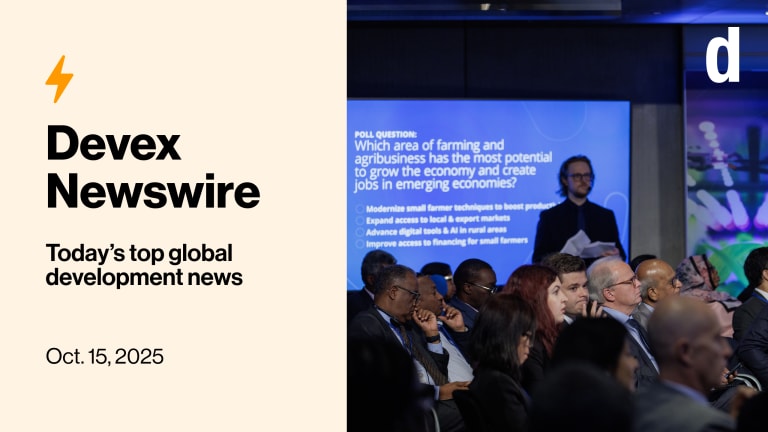
NAIROBI — Economic stability and the Sustainable Development Goals are inexorably linked, but discussion on how to pursue economic stability is often absent from the global development dialogue. The 2008 global financial meltdown, climate change, technological changes, as well as shifting labor and employment trends have left huge swaths of workers and small businesses without the protections and security they might have had previously.
Innovation in technology, finance, and policy, are critical in giving countries coping mechanisms to confronting the “volatile and erratic conditions, asymmetrical information, and a lack of protection” that can leave people economically vulnerable, according to “The Atlas of Innovation for Economic Stability.”
Released this week by FHI 360, with support from The Rockefeller Foundation, the report focuses on 63 examples of innovations aimed at promoting economic stability with an emphasis on the poor and vulnerable. Most of these innovations were privately-provided and enabled by mobile technology.
The report identified innovation hot spots as existing in Kenya, the United States, Indonesia, and Brazil, crowning India as the “world’s most dynamic lab for stability-enhancing innovations.” Democratization of data access on mobile devices and heightened financial inclusion were highlighted as being pivotal in encouraging economic stability.
“If we are to achieve the Sustainable Development Goals, we will need new approaches, new types of partnerships, and a new mindset that encourages new actors to come to the table,” said Patrick Fine, chief executive officer of FHI 360.
Here are some of the innovations highlighted in the “The Atlas of Innovation for Economic Stability” report:
• For micro-, small- and medium-sized enterprises, legal and regulatory compliance is a key challenge. Small enterprises operated by people in poverty can often have issues registering businesses, navigating regulatory systems, and accessing the justice system. mSME Garage in Uganda provides basic legal services and business guidance through an online portal, social media, SMS, and WhatsApp messages. In Nigeria, technology startup Orodata works to simplify and make public data accessible — such as industry standards and regulations — through cloud-based solutions and software as a service products to inform business decisions.
• Automation and the trend toward more informal working arrangements have decreased stability for workers in areas such as benefits and income stability. The Universidad del Pacífico, University of Maryland, and Innovations for Poverty Action, in collaboration with the Pension Fund Administrators Association of Peru, are piloting a project in Lima, Peru, to test the impact of a pension match scheme on enrollment and contributions to pensions among informal workers of small firms. In Austria, Refugeeswork is an online platform to connect refugees with businesses that are hiring.
• Middle-income countries often lack the universal entitlements that are present in many high-income countries. The Mahatma Gandhi National Rural Employment Guarantee Act in India guarantees 150 days — seeing an increase of 50 days in 2015 — of paid employment per year for rural households that volunteer for unskilled manual labor. Finland is piloting a form of universal basic income, providing citizens with a monthly income regardless of their financial situation.
• Financial risk has traditionally burdened the poor, particularly small-scale farmers and workers with unstable incomes. The International Food Policy Research Institute’s risk-contingent credit program is an insurance scheme that works to mitigate drought-related production risks and provide previously uninsured farmers access to credit. myAgro in Mali uses a prepaid scratch card model that allows farmers to purchase seed, fertilizer, and trainings incrementally through a mobile-based platform and a network of vendor partners.
Agritech startups aim to lift Nigerian smallholder farmers out of poverty
Nigeria imports $20 billion in food each year — even as its farmers struggle to get by. To address the gap, a number of agritech startups have appeared in Nigeria hoping to use a range of tools to improve the livelihood of smallholder farmers and the viability of local agriculture.
• The number of unique mobile subscribers surpassed 5 billion in 2017, with 62 percent of the populations in low- and middle-income countries using mobile technology. In Kenya, Twiga Foods provides a mobile-based connection between farmers and urban grocers to minimize post-harvest losses and promote more stable and predictable markets. In India, Voice4All gives small-scale farmers information about agriculture markets and allows them to record, browse and respond to questions and answers about farming through an interactive voice application.
• Lack of personal security inhibits stability as people move through cities. In Brazil, Fogo Cruzado and Onde Tem Tiroteio gather reports from citizens and police about shootings, providing alerts to nearby users. In South Africa, CrashDetech automatically detects the impact of vehicle collisions and alerts the CrashDetch emergency contact center to send the nearest paramedics in response.
• The lack of access to identification is also keeping vulnerable populations disenfranchised, as well as recognition of ownership of land. The Bangladesh government has a system of village courts to help low-income rural residents with small disputes over debt, land, and crime. ZOA has a land tenure registration program in Burundi that has been piloting hosting dialogues to discuss barriers that prevent women from owning land.








